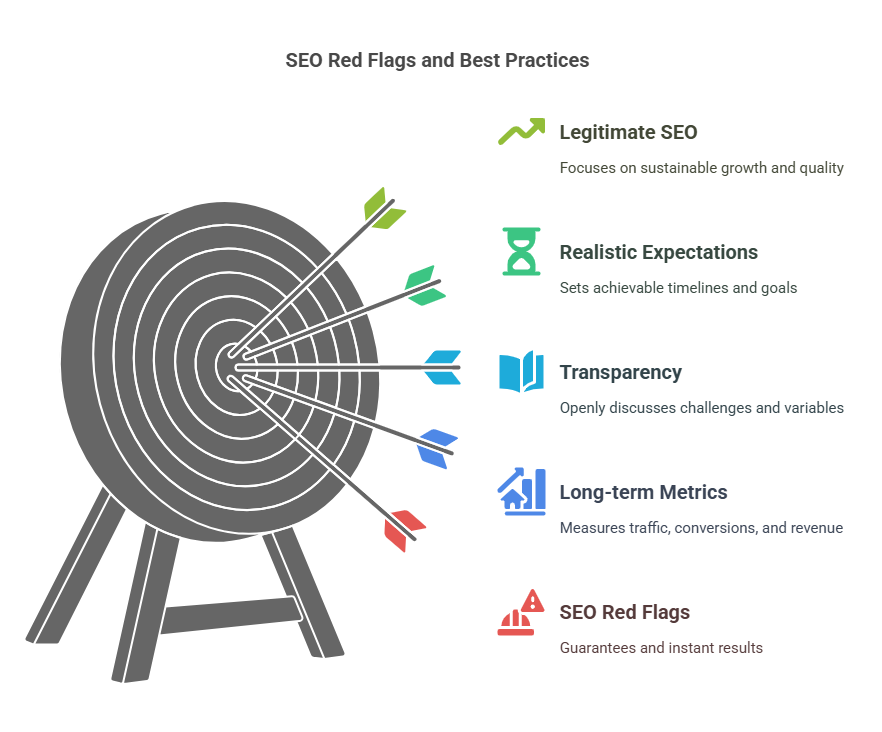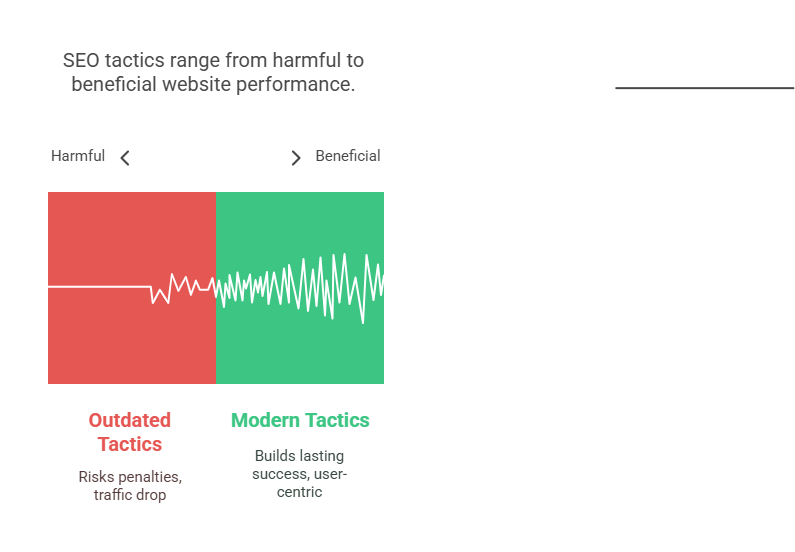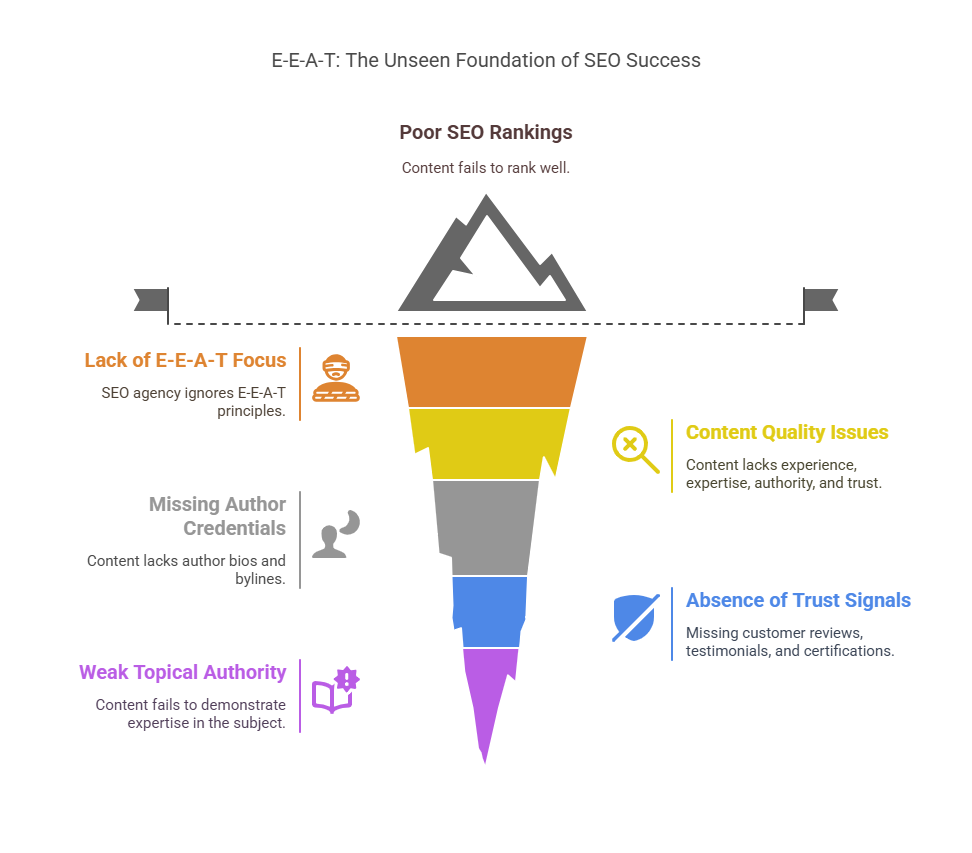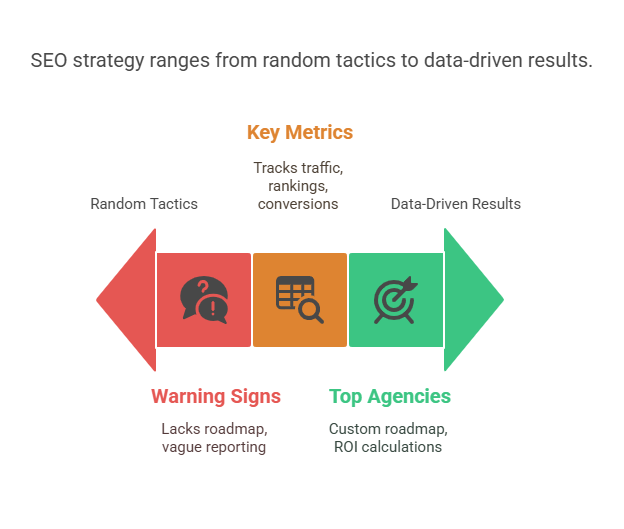Picture this: You hire an SEO company with big promises and flashy guarantees. Six months later, your website traffic has plummeted, your Google rankings have vanished, and you’re staring at a potential penalty that could take years to recover from.
Unfortunately, this nightmare scenario happens to thousands of businesses every year. According to a recent Search Engine Journal survey, 47% of businesses have experienced negative results from poor SEO practices, resulting in an average revenue loss of $75,000 annually.
The wrong SEO agency can tank your rankings, waste your budget, and even get your site penalized by Google. The stakes are incredibly high when it comes to choosing the right SEO partner.
“The biggest mistake businesses make is choosing SEO agencies based on price rather than expertise. Quality SEO is an investment that pays long-term dividends, while cheap SEO is often an expense that creates long-term problems.” – Brian Dean, Backlinko
Here’s the reality: SEO is a complex, ever-evolving field that requires genuine expertise, patience, and ethical practices. But the industry is also flooded with agencies that cut corners, make unrealistic promises, and use tactics that can seriously damage your online presence.
The good news? You can protect yourself by knowing what to look for. Let’s break down the top red flags to avoid and what to look for instead when choosing an SEO company that will actually help your business grow.
Red Flag #1: Guaranteed Rankings or Instant Results

If an SEO company promises you’ll be “#1 on Google in 30 days” or guarantees specific rankings, run the other way. This is probably the biggest red flag in the entire SEO industry.
What to Watch For
- Phrases like “#1 on Google in 30 Days” or “Guaranteed first page rankings”
- Claims about “instant results” or “overnight success”
- Over-promising outcomes with no data to back claims
- Contracts that guarantee specific ranking positions
- Marketing materials that focus on rankings rather than business results
Why It’s a Problem
Here’s the truth that every legitimate SEO professional knows: No one controls Google’s algorithm — not even the best SEO expert in the world. Google uses over 200 ranking factors, and the algorithm changes constantly with an average of 3,234 improvements made annually according to Google’s own data.
Any company promising guaranteed rankings is either lying to you or planning to use manipulative tactics that could get your site penalized. Google explicitly warns against companies that guarantee rankings, and for good reason.
“Anyone who guarantees #1 rankings is either lying or using techniques that will eventually get your site penalized. Real SEO takes time, and results depend on countless variables beyond any agency’s control.” – John Mueller, Google Search Advocate
Legitimate SEO takes time. Period. You’re not just trying to trick Google into ranking your site higher — you’re building genuine authority, creating valuable content, and improving your website’s overall quality. This process simply cannot happen overnight.
What You Should See Instead
- A realistic timeline (typically 4–12 months for meaningful results)
- Focus on long-term growth metrics like organic traffic, conversions, and revenue
- Emphasis on improving your website’s overall quality and user experience
- Transparent discussion about the challenges and variables involved in SEO
- Case studies showing gradual, sustainable growth rather than sudden ranking jumps
The best SEO companies will set realistic expectations and focus on metrics that actually matter to your business, like qualified traffic and conversions, not just rankings.
Red Flag #2: Lack of Transparency or Communication
SEO shouldn’t be a black box. If your agency can’t or won’t explain what they’re doing, that’s a serious problem.
What to Watch For
- Vague work reports or no regular updates
- Refusal to explain strategies or tools used
- Secretive about their link building methods
- Won’t provide access to analytics or reporting dashboards
- Dodges questions about their tactics or processes
- Claims their methods are “proprietary secrets”
Why It’s a Problem
Transparency isn’t just nice to have — it’s essential. If you don’t know what your agency is doing, you can’t tell if it’s helping or hurting your rankings. Recent data from SEMrush shows that 68% of successful SEO campaigns involve clients who actively understand and participate in the strategy.
Moreover, agencies that hide their methods often do so because they’re using questionable tactics. Legitimate SEO work doesn’t need to be kept secret. In fact, the best agencies are usually excited to share their strategies and educate their clients.
Remember, this is your website and your business on the line. You have every right to understand what’s being done in your name.
Pro Tip
Before signing any contract, ask for sample reports, request access to reporting dashboards, and insist on regular check-in calls. A good agency will be happy to provide these things and will see your interest as a positive sign that you’re serious about SEO success.
Also, ask them to walk you through their typical process during the sales call. If they can’t clearly explain their methodology, that’s a red flag.
Red Flag #3: Black Hat or Outdated SEO Tactics

Some SEO companies are still stuck in 2010, using tactics that not only don’t work anymore but can actively harm your website’s performance.
What to Watch For
- Link schemes, Private Blog Networks (PBNs), or buying links in bulk
- Keyword stuffing or hidden/invisible text on pages
- Automated, low-quality content creation
- Article spinning or content farms
- Exact match anchor text manipulation
- Cloaking or showing different content to search engines vs. users
- Negative SEO attacks on competitors
What’s Risky About This?
These black hat techniques might have worked years ago, but Google has gotten much smarter. Using these tactics today is like playing with fire while standing in a gasoline factory.
According to Moz’s 2024 penalty recovery study, websites hit with manual penalties see an average traffic drop of 85%, and only 23% ever fully recover their original rankings.
Even if you don’t get penalized immediately, these tactics create a house of cards that will eventually collapse. Google’s algorithm updates consistently target these manipulative practices.
“Black hat SEO is like taking performance-enhancing drugs in sports. You might see short-term gains, but the long-term consequences are devastating. Focus on sustainable, white-hat strategies that build lasting success.” – Rand Fishkin, SparkToro
Modern SEO Tactics They Should Be Using
- High-quality link earning through genuine outreach and relationship building
- Helpful, user-centric content aligned with actual search intent
- Topical authority building through comprehensive content coverage
- E-E-A-T optimization (Experience, Expertise, Authoritativeness, Trustworthiness)
- Technical SEO improvements that enhance user experience
- Data-driven content optimization based on user behavior
The best agencies focus on tactics that align with Google’s goals: providing users with the most helpful, relevant, and trustworthy content possible.
Red Flag #4: One-Size-Fits-All SEO Packages
If an SEO company offers the exact same package to every client regardless of industry, business size, or goals, that’s a major red flag.
What to Watch For
- Identical deliverables for every client (same number of blog posts, links, etc.)
- No discovery phase or business analysis during onboarding
- Cookie-cutter proposals that could apply to any business
- Unwillingness to customize their approach based on your specific needs
- Generic keyword research that doesn’t consider your unique market position
Why It’s a Problem
Your business is unique — your SEO strategy should be too. A local restaurant has completely different SEO needs than a SaaS company or an e-commerce store. Your target audience, competition, industry regulations, seasonal trends, and business goals all impact what SEO tactics will be most effective.
One-size-fits-all approaches typically indicate that the agency is more focused on scaling their operations than delivering results. They’re essentially running an SEO factory rather than providing strategic consulting.
What to Look For
- Custom audits that analyze your specific website and competitive landscape
- Keyword strategies tailored to your business goals and target audience
- Campaigns designed around your budget, timeline, and priorities
- Industry-specific knowledge and case studies
- Flexibility to adjust tactics based on what works for your particular situation
The right agency will ask lots of questions about your business before proposing any strategy. They should understand your customers, your competition, and your goals before suggesting tactics.
Red Flag #5: No Focus on E-E-A-T

If an SEO agency hasn’t heard of E-E-A-T or doesn’t factor it into their strategies, they’re behind the times in a dangerous way.
What Is E-E-A-T?
E-E-A-T stands for Experience, Expertise, Authoritativeness, and Trustworthiness. These are key factors that Google’s quality raters use to evaluate content, and they’ve become increasingly important for rankings, especially in competitive industries.
- Experience: Does the content creator have first-hand experience with the topic?
- Expertise: Does the author have the knowledge and skills needed to write about this subject?
- Authoritativeness: Is the author or website recognized as a go-to source for this type of information?
- Trustworthiness: Can users trust the information and the website providing it?
Why It Matters
Google has made it clear that E-E-A-T is crucial for content quality assessment. According to Google’s Search Quality Evaluator Guidelines, E-E-A-T is now a primary factor in determining content rankings, especially for YMYL (Your Money or Your Life) topics.
SEO companies that don’t optimize for E-E-A-T may deliver content that never ranks, no matter how well-optimized it is for keywords.
“E-E-A-T isn’t just about having credentials. It’s about demonstrating real experience and building genuine trust with your audience. Content without E-E-A-T is just noise in today’s search landscape.” – Marie Haynes, Marie Haynes Consulting
Green Flags
- Author bios and bylines for all content
- Expert content creation using subject matter experts
- Trust signals like customer reviews, testimonials, and certifications
- Structured content that demonstrates topical authority
- Citing authoritative sources and linking to credible references
- Clear contact information and about pages
A good SEO agency will audit your current E-E-A-T signals and develop strategies to strengthen them across your website.
Red Flag #6: Ignoring Google’s Helpful Content Update
Google’s Helpful Content Update fundamentally changed how content should be created for SEO. Agencies that haven’t adapted are setting their clients up for failure.
What to Watch For
- Over-reliance on keywords instead of solving real searcher problems
- Thin, AI-generated blog posts with no unique value or insights
- Content created primarily for search engines rather than humans
- No consideration of user intent beyond basic keyword matching
- Quantity-focused content strategies (publishing lots of mediocre content)
The Problem with Old-School Content Approaches
Google’s Helpful Content Update specifically targets content that seems to be created primarily for search engines rather than people. Data from Search Engine Land shows that sites producing thin, keyword-focused content saw traffic drops of up to 40% following the update.
The update rewards content that demonstrates first-hand experience and expertise while penalizing content that feels like it was created just to capture search traffic.
What a Great Agency Does
Creates content based on real user intent and genuine helpfulness — not just rankings. They understand that Google’s goal is to surface the most helpful content for users, and they align their strategies accordingly.
Modern content strategies focus on:
- Solving real problems that your target audience faces
- Providing unique insights and perspectives
- Creating comprehensive resources that users will actually find valuable
- Optimizing for user experience metrics like time on page and return visits
Red Flag #7: No Technical SEO or Mobile Optimization
Some agencies focus exclusively on content and links while completely ignoring the technical foundation that makes SEO possible.
Common Oversights
- No audits for site speed, crawl issues, or mobile user experience
- Failure to monitor and optimize Core Web Vitals
- Ignoring structured data and schema markup opportunities
- No attention to internal linking architecture
- Missing XML sitemaps or robots.txt optimization
- Poor URL structure and site architecture
Why This Matters
Technical SEO is the foundation that everything else builds on. You can have the best content in the world, but if Google can’t crawl your site effectively, or if your pages load too slowly, you’ll struggle to rank.
Mobile optimization is especially critical since Google uses mobile-first indexing. According to Google’s mobile-first indexing guidelines, 63% of organic search visits now come from mobile devices.
Core Web Vitals have become official ranking factors, measuring real user experience metrics like loading speed, interactivity, and visual stability. Ignoring these signals can significantly impact your search performance.
“Technical SEO is like the foundation of a house. You can have the most beautiful rooms, but if the foundation is cracked, the whole structure is at risk. Never neglect the technical basics.” – Barry Schwartz, Search Engine Land
Ask If They Offer
- Comprehensive technical audits with clear, prioritized action plans
- Core Web Vitals monitoring and optimization
- Mobile usability testing and improvements
- Site architecture recommendations
- Page speed optimization strategies
- Schema markup implementation
The best agencies treat technical SEO as an ongoing process, not a one-time checklist item.
Red Flag #8: Suspiciously Low Prices

While everyone loves a good deal, extremely low-priced SEO services are almost always too good to be true.
What to Watch For
- SEO packages under $500 per month
- “Unlimited backlinks” or “Lifetime SEO” offers
- Prices that seem dramatically lower than other agencies
- Agencies that compete primarily on price rather than results
- No clear explanation of what’s included in low-priced packages
Why It’s a Trap
Quality SEO requires significant time, expertise, and resources. When agencies offer suspiciously low prices, they usually cut corners somewhere. According to HubSpot’s 2024 Marketing Report, businesses that invest less than $1,000 monthly in SEO see 73% lower ROI compared to those investing $2,500 or more.
Low-priced agencies typically:
- Outsource work to inexperienced freelancers
- Use automated tools instead of human expertise
- Focus on quantity over quality (lots of low-quality links or content)
- Use risky black hat tactics to reduce costs
- Provide minimal actual work while charging for “monitoring”
Think about it this way: if you’re paying $300 per month for SEO, and the agency is profitable, how much actual expert time can they really be dedicating to your account?
What Quality SEO Actually Costs
Professional SEO services from reputable agencies typically start around $1,500-$3,500 per month for small businesses, and can go much higher for larger companies or competitive industries. This reflects the real cost of:
- Experienced SEO professionals
- Quality tools and software
- Time for proper research, analysis, and implementation
- Ongoing monitoring and optimization
Remember, effective SEO can drive significant revenue for your business. Investing in quality services usually pays for itself many times over.
Red Flag #9: No Real Case Studies or Testimonials
If an SEO agency can’t show you concrete examples of their success, that’s a serious red flag.
What to Watch For
- Vague testimonials with no specific results or business names
- Case studies that focus on vanity metrics rather than business results
- No verifiable examples of their work
- Reluctance to connect you with current or past clients
- Generic stock photos instead of real client businesses
What to Look For Instead
- Detailed case studies with specific results (traffic increases, ranking improvements, revenue growth)
- Verified testimonials with actual business names and contact information
- Before-and-after examples that show measurable improvement
- Awards or recognition from industry organizations
- References you can actually contact
“The best SEO agencies are proud of their results and eager to share them. If they can’t show you concrete success stories with real numbers, they probably don’t have any.” – Neil Patel, NeilPatel.com
Bonus Questions to Ask
Don’t just look at what they show you — ask the right questions:
- “Can you show me a client who was in a similar situation to ours?”
- “What challenges did you face with this client, and how did you overcome them?”
- “Can I speak with a current client about their experience?”
- “How do you measure success for clients in our industry?”
Good agencies are proud of their results and happy to connect you with satisfied clients. If they can’t or won’t do this, keep looking.
Red Flag #10: No Strategy, Reporting, or ROI Tracking

SEO without strategy is just random tactics. And SEO without measurement is just hope.
Warning Signs
- No clear roadmap or strategy document
- Vague or infrequent reporting
- Reports that focus on vanity metrics rather than business results
- No connection between SEO activities and business goals
- Inability to show ROI or return on investment
- No use of analytics tools or data-driven decision making
What Top Agencies Provide
- A detailed, custom SEO roadmap with clear milestones and timelines
- Regular reports (usually monthly) showing organic traffic, rankings, leads, and conversions
- Goal tracking via Google Analytics, Search Console, and other relevant tools
- Clear connections between SEO activities and business outcomes
- ROI calculations that show the financial impact of their work
- Recommendations for optimization based on data analysis
Key Metrics They Should Track
A good SEO agency should track and report on metrics that actually matter to your business:
- Organic traffic growth (overall and to key pages)
- Keyword rankings for terms that drive business value
- Conversion rates from organic traffic
- Revenue or leads generated from organic search
- Core Web Vitals and user experience metrics
- Brand visibility and search presence
They should also be able to explain how their SEO work connects to your broader business goals and marketing objectives.
Pro Tip: Use an SEO Vetting Checklist
Don’t trust your memory when evaluating SEO agencies. Create a systematic approach to comparing your options.
Here’s what your vetting process should include:
Questions to Ask Every Agency
- “Can you walk me through your typical SEO process?”
- “How do you stay updated with Google algorithm changes?”
- “What tools do you use, and will I have access to the data?”
- “How do you measure success, and how often will you report results?”
- “Can you provide references from clients in similar industries?”
- “What happens if we don’t see results in the first 6 months?”
- “How do you handle Google penalties or algorithm updates that negatively impact rankings?”
Red Flags Checklist
Use this checklist when evaluating potential SEO partners:
- Do they guarantee specific rankings or promise instant results?
- Are they transparent about their methods and willing to explain their strategies?
- Do they focus on modern, white-hat SEO tactics?
- Do they customize their approach based on your specific business needs?
- Do they understand and optimize for E-E-A-T?
- Are they updated on Google’s latest algorithm changes?
- Do they include technical SEO and mobile optimization?
- Are their prices realistic for quality SEO work?
- Can they provide verifiable case studies and references?
- Do they offer clear strategy, reporting, and ROI tracking?
If an agency fails any of these criteria, consider it a warning sign. If they fail multiple criteria, definitely look elsewhere.
How to Find the Right SEO Partner
Now that you know what to avoid, here’s how to find an SEO agency that will actually help your business grow:
Start with Referrals
Ask other business owners in your network about their experiences with SEO agencies. Personal referrals from trusted sources are often the best way to find quality providers.
Look for Industry Recognition
Check if agencies have been recognized by reputable organizations like:
- Google Partner status
- Industry awards from organizations like Search Engine Land or Moz
- Speaking engagements at major SEO conferences
- Published content in respected industry publications
Evaluate Their Own SEO
This might seem obvious, but check how well the agency ranks for relevant keywords. If they can’t get their own website to rank well, how can they help yours?
Test Their Knowledge
During your initial conversations, ask about recent Google updates or current SEO best practices. A good agency should be able to discuss these topics knowledgeably and explain how they impact their strategies.
Final Thoughts
Choosing the right SEO company can be the difference between online success and digital disaster. The best SEO agencies are transparent, up-to-date, ethical, and focused on long-term success — not quick hacks or manipulative tactics.
Remember, effective SEO is an investment in your business’s future. It takes time, expertise, and the right strategy to deliver sustainable results. Don’t fall for flashy promises or unrealistic guarantees. Instead, look for agencies that understand your business, use proven strategies, and can demonstrate real results for clients like you.
The red flags we’ve covered aren’t just warning signs — they’re early indicators of agencies that could seriously damage your online presence. By being aware of these issues and asking the right questions, you can avoid costly mistakes and find a partner who will help your business thrive online.
Get More SEO Insights
Want to dive deeper into choosing the right SEO strategy for your business? Check out these related resources:
- How to Choose an SEO Agency (Without Getting Ripped Off) – A comprehensive guide to evaluating and selecting the perfect SEO partner for your business needs.
- What Google’s Helpful Content Update Means for Your Site – Understanding how Google’s latest algorithm changes affect your content strategy and rankings.
- The Beginner’s Guide to Core Web Vitals – Learn how to optimize your website’s technical performance for better user experience and search rankings.
Remember, the best defense against SEO scams is education. The more you understand about how SEO really works, the better equipped you’ll be to make smart decisions for your business.


